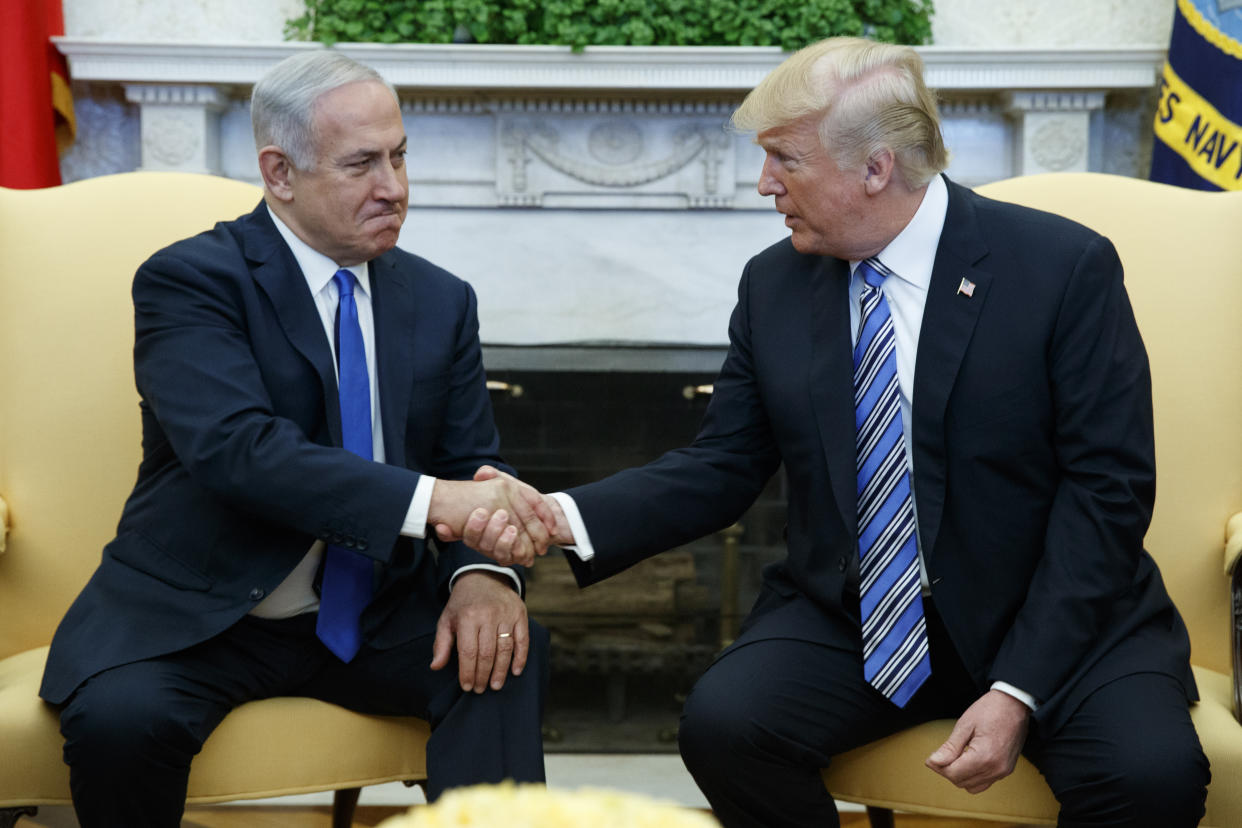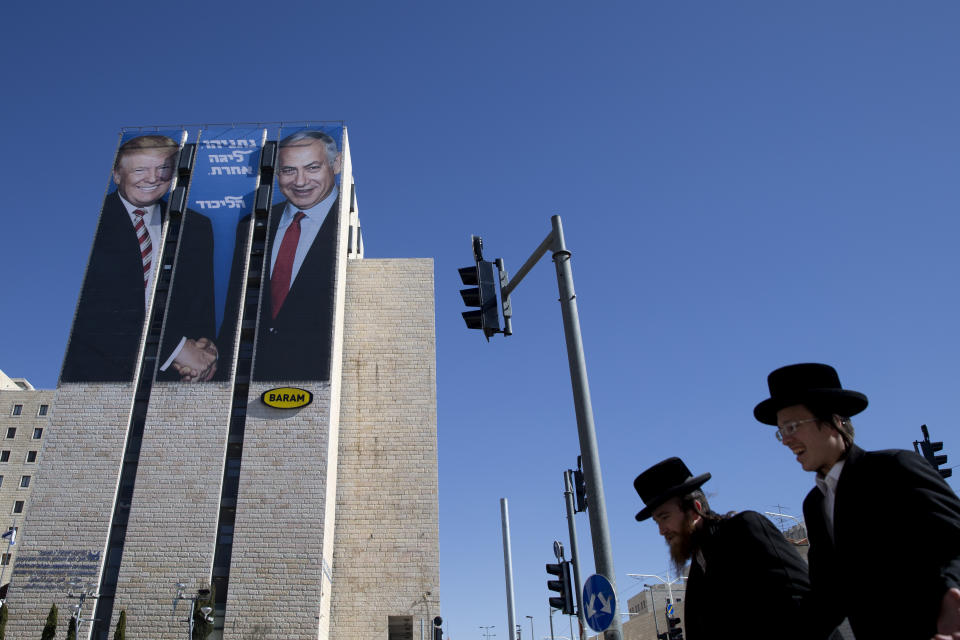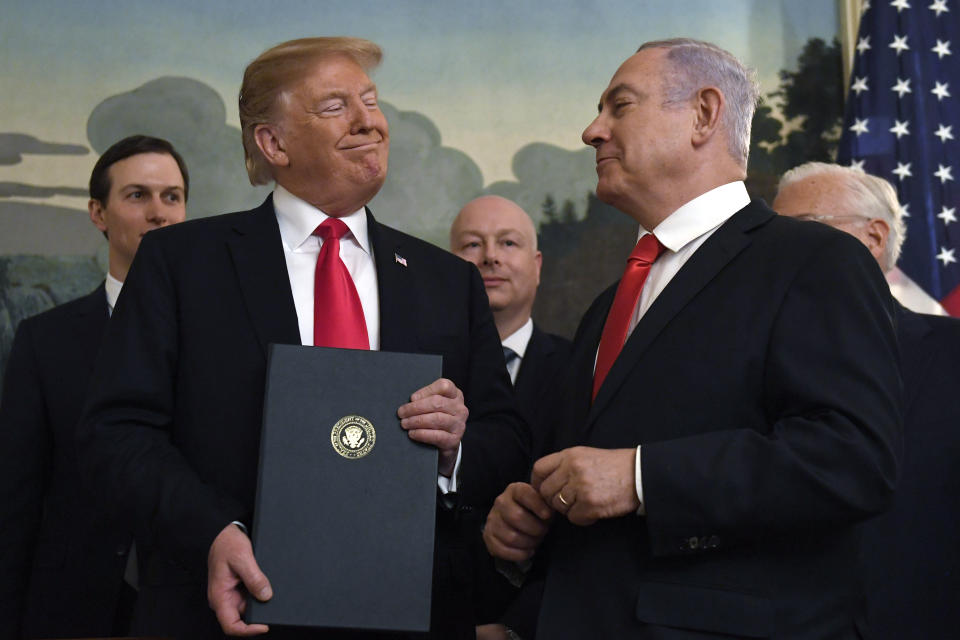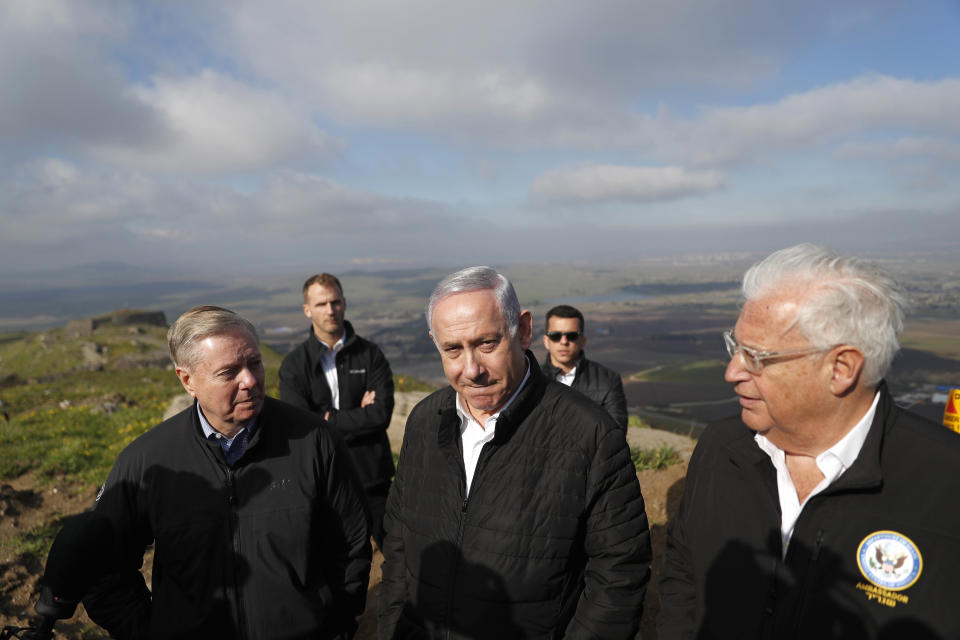Trump peace plan's fate at stake in Israeli election Tuesday

As troubles mount on the borders, a brash right-wing leader beset by allegations of corruption is seeking reelection, facing opponents promising to restore trust in the country’s democratic institutions and heal deep partisan divisions.
The country is Israel, and the candidate is Prime Minister Benjamin “Bibi” Netanyahu, but if the scenario has echoes in U.S. politics, that is more than coincidental. Not, perhaps, since Winston Churchill and Franklin D. Roosevelt fought World War II side by side have the leaders of two countries been more closely aligned than Netanyahu and President Trump. And what happens in the Israeli elections on Tuesday could both foreshadow and affect Trump’s fate.
Netanyahu’s legal problems have intensified as he faces the greatest challenge to his political survival in a decade. The prime minister has been a suspect in several investigations for more than two years, with investigators alleging that Netanyahu received lavish gifts from several billionaires in exchange for personal favors and that he exchanged favorable legislation and regulatory measures for positive coverage by some media outlets. Those investigations came to a head in February when Attorney General Avichai Mandelblit announced his intention to indict Netanyahu on charges of breach of trust, bribery and fraud.
The official indictment is not expected for a few months. But it is unlikely Netanyahu’s legal problems will force him to step down any time soon. A sitting prime minister charged with a crime is required to step down only after he has exhausted every legal appeal, a process that could take years.

Still, Israelis are in uncharted territory: Even though former Israeli prime ministers have been brought down by legal problems, Netanyahu will be the first to be indicted while holding office, and he is violating a long-standing norm of resigning in the face of criminal allegations (as his predecessor, Ehud Olmert, did). Not only has Netanyahu refused to resign, but he has tried to delegitimize the inquiry, accusing the media of colluding with the legal establishment in order to take him down and blaming the attorney general for giving in to left-wing political pressure — even though he was a Netanyahu appointee. In language that will be familiar to Americans, he has called the investigation a “witch hunt.”
Meanwhile, Netanyahu also faces his most formidable electoral challenge since he was was ousted after his first term as prime minister in 1999, from the centrist Blue and White Party led by Benny Gantz and Yair Lapid. While Lapid is an experienced politician, Gantz is a newcomer to politics, but he has establishment credentials as a former chief of staff of the Israeli Defense Forces, a common path to political power in Israel. Gantz has been conspicuously tight-lipped about the specific policies he would pursue as prime minister, and he has instead run on a broader vision of an alternative to Bibi: In place of right-wing rule, he has offered non-ideological pragmatism, and in place of Netanyahu’s brash style, he has promised restraint, decorum and transparency, committing himself to ending corruption and healing a society fractured by Netanyahu’s divisive leadership. Furthermore, while Bibi has built his career on his reputation for taking a hard line toward the Palestinians and Iran, Gantz has relied on his military background — as well as those of other senior leaders of his party, such as Moshe Ya’alon and Gabi Ashkenazi, who also served as chiefs of staff — to bolster his national-security credentials against Netanyahu and his Likud party.

The election is taking place against the background of Israel’s existential effort to chart a future relationship to the Palestinians and with the rest of the Middle East, and ongoing demonstrations, sporadic violence and even the threat of an imminent war coming from Gaza. Last month, in what was widely regarded as an effort to boost his ally Netanyahu, Trump declared that the United States would formally recognize Israel’s sovereignty over the Golan Heights, a strip of land it seized from Syria in the 1967 war. And just three days before the election, Netanyahu announced on television that if reelected he would begin annexing the parts of the West Bank where Israelis have settled — a fateful step that could further isolate Israel at the United Nations.
Nevertheless, the campaign has largely been fought as a referendum on Netanyahu’s leadership. While his rivals have focused on his legal problems and his polarizing political style, Netanyahu has presented himself as a powerful figure on the world stage, who after a decade in power has developed close personal relationships with Trump and even Russian President Vladimir Putin, which are of immense value to Israel’s national security.
The campaign has been exceptionally bitter and acrimonious even by the standards of Israel’s typically cut-throat politics. Gantz and Lapid have seized on a new scandal implicating close associates of Netanyahu in an alleged kickback scheme involving the purchase of naval vessels from a German ship-builder and the sale of submarines to Egypt, and questions about why deals happened without approval from the appropriate ministers. Yet Gantz has also been the subject of several scandals. In March, it was revealed that Shin Bet, Israel’s internal security service, believed Gantz’s phone had been hacked by Iran, which raised concerns that Gantz could be blackmailed. And over the course of the election, numerous tapes of Gantz speaking in private have been leaked to the public, including one in which Gantz said he would consider joining a coalition led by Netanyahu, something Gantz now denies he would do.
In the April 9 election, Gantz’s Blue and White and Netanyahu’s Likud are expected to win roughly the same number of seats in the Knesset, although some polls give Blue and White a small edge. But given the proliferation of right-wing parties that may win at least some seats, Likud has a better chance of putting together a majority coalition in the Knesset, so even if his party comes in second, Netanyahu may still serve another term as prime minister.

Yet if Netanyahu does serve another term as prime minster, he may govern alongside right-wing factions that are even more empowered than they are in his current government. One question is whether the incoming government will pass an immunity law, or what Israelis call the “French law,” after a 2001 court ruling that the president of France was immune to prosecution while in office. Right-wing members of the Knesset have so far indicated that they are reluctant to support immunity for Netanyahu, but the issue may give them leverage in forming a new government, or in pursuing their agenda.
The election outcome may also decide the fate of Trump’s long-promised “deal of the century,” the Israeli-Palestinian peace plan proposal that Trump’s son-in-law, Jared Kushner, has been preparing for two years. Some expect the proposal, whose details remain largely unknown, to arrive shortly after the election.
The implementation of a two-state solution and the establishment of a Palestinian state would require Israel to withdraw from the West Bank and Gaza, territories that it acquired in the course of the 1967 Six-Day War and which Palestinians want for their future state. And while the Trump administration’s plan is widely assumed to call for Israel to make some territorial concessions, there are already hints that the proposal will meet widespread resistance in Israel, especially by the nationalist parties. One hint that the Israeli right will try to stymie the deal came in February, when Kushner gave an interview with Sky News Arabia and inadvertently spurred a raucous public debate in Israel. His remarks that the conflict was “really about establishing borders” alarmed factions that oppose territorial concessions and were the first indication that the proposal may divide the Israeli public when it is released. The remarks initiated a debate between Netanyahu and the right-wing education minister, Naftali Bennett, with Bennett accusing Netanyahu of collaborating with both Gantz and Trump and Kushner to implement a “two-state solution” and Netanyahu assuring the public that he opposed a Palestinian state, a point about which he has gone back and forth over the years.

West Bank annexation is another potential obstacle to U.S. peace plans. When Trump recognized the Golan Heights as part of Israel last month, some in Israel interpreted it as a sign that the United States would tolerate Israel’s annexing territories in the West Bank. U.S. Secretary of State Mike Pompeo denied that the policy set a precedent for other territories seized during the 1967 war, but Netanyahu hinted he saw things differently: “When you start wars of aggression, you lose territory. Do not come and claim it afterward. It belongs to us,” he said to reporters in Israel returning from his meeting with Trump in Washington, in which the recognition was made official. “Everyone says you can’t hold an occupied territory, but this proves you can. If occupied in a defensive war, then it’s ours.”
Then came Netanyahu’s announcement of his intention to annex parts of the West Bank if elected — and not just the settlement blocs near the 1967 borders, but even remote outposts deep in the West Bank. “Will we move ahead to the next stage? Yes. I will extend sovereignty, but I don’t distinguish between the settlement blocs and the isolated ones, because each settlement is Israeli, and I will not hand it over to Palestinian sovereignty.” When he was asked if he would evacuate settlers from Israeli settlements in the West Bank if the Trump peace plan required it, he said: “That will not be happening. If that’s the [Trump administration’s] plan, there will be no plan.”

Not all observers took Netanyahu’s statements at face value. Some pointed out they were reminiscent of similar remarks that Netanyahu made in the final days of the 2015 Israeli election, when, in order to shore up support from his base, Netanyahu announced that he opposed the establishment of a Palestinian state, only to backtrack in the days after the election. But whatever Netanyahu actually meant, his remarks suggest a problem on the horizon for the Trump administration. Ever since Trump recognized Jerusalem as the capital of Israel in December 2017, the Palestinian leadership has categorically refused to participate in U.S.-led negotiations with Israel, claiming Trump has forfeited any claim to impartiality. But now, despite his generous concessions toward Israel, he may face a right-wing government in Jerusalem that is just as suspicious of any peace plan he puts forward.
Ben Manson is a freelance journalist based in Israel and New York.
_____
Read more from Yahoo News:


